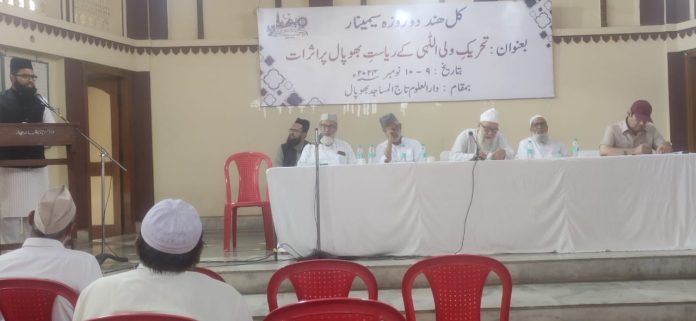– Pervez Bari
Bhopal: A two-day seminar on “Impact of Tehreek-e-Waliullah Dehlawi on The State of Bhopal” was held at Darul Uloom Taj-ul-Masjid here Tuesday.
In his address, Bhopal’s Canada-based Dr. Iqbal Masood Nadvi, while presiding over a session of the seminar, said that Shah Waliullah Dehlawi, had three such qualities which can be a model for us today. The qualities of jihad, ijtihad and mujahida were found in him which if we inculcate today in ourselves, we can do a great service to the religion. He also presented his paper and explained various scholarly and intellectual points.
Qutb ud-Din Ahmad ibn ʿAbd-ur-Rahim al-ʿUmari ad-Dehlawi (1703–1762), was commonly known as Shah Waliullah Dehlawi. He contributed to Islamic revival in the Indian sub-continent, and is therefore seen by his followers as a re-newer.
Shah Waliullah Dehlawi was born on 21st February 1703 to Shah Abdur Rahim, a prominent Islamic scholar of Delhi. He became to be known as Shah Waliullah because of his piety. He memorised the Qur’an by the age of seven. Soon thereafter, he mastered Arabic and Persian letters. He was married at fourteen. By fifteen he had completed the standard curriculum of Hanafi law, theology, geometry, arithmetic and logic; two years later after the demise of his father he succeeded him as the dean of his Madrasah-i-Rahimiyah. His father, Shah Abdur Rahim was the founder of the Madrasah-i-Rahimiyah. He died on Friday the 29th of Muharram 1176 AH/ 20 August 1762 at Jummah prayer in Delhi, aged 59.
Presiding over the inaugural session, Ameer Darul Uloom, Taj-ul-Masajid Maulana Prof. Muhammad Hassan Khan said: “It is a matter of all-round agreement that Shah Waliullah Dehlawi is a very important pillar of the propagation of Islam in India. The period in which he was born is said to be four years before the death of Aurangzeb Alamgeer, when the beginning of the decline of the Mughal rule had started.
Prof. Hassan further said that the time of Shah Waliullah was at the lowest ebb of backwardness among Muslims of India while there was an imprint of rational sciences on the educational stage. Shah Waliullah revived the knowledge of the Book and Sunnah.
Delivering the keynote address in the inaugural session, Prof. Nauman Khan (Retired Professor NCERT, New Delhi), Prof. Nauman shed a comprehensive light on Shah Waliullah’s commitment to the State of Bhopal through his thoughts and movement.
The chief guest of the seminar, Maulana Umair Siddique Daryabadi Nadvi (Editor of the Monthly Ma’arif, Azamgarh) presented a paper where he quoted clippings of Allama Shibli and Allama Syed Sulaiman Nadvi wherein they mentioned Shah Waliullah Dehlawi very eloquently and also mentioned Bhopal state’s close association with the Movement of Shah Waliullah. While on one hand Mughal rule era’s sun was setting down on the other hand for Muslims a new sun was rising in the form of Shah Waliullah Dehlawi.
The Deputy Head of Darul Uloom Taj-ul-Masajd, Maulana Dr. Athar Habib Nadvi, in his welcome address, presented the personality of Shah Waliullah as a comprehensive personality. He also pointed out that if this person had been born in the distant past, he would certainly have been counted among the Mujaddidin, Imams of mujtahidin and Faqih-e-Ummah. With deep concern, care, worry and courage with which Shah Waliullah worked during the decline of the Mughal Empire are a torch-bearer for today’s generation. Today his personality needs to be made a role model.
The first session was presided over by Dr. Sufiyan Hassan Nadvi wherein four papers were presented. The first paper was presented by Prof. Nauman Khan of Delhi, titled: “Muhaddis and Adeeb Muhammad bin Hussain bin Mohsin bin Muhammad Ansari Khazraji Saadi”. He gave references to books in which Muhammad bin Hussain is mentioned. The second paper was presented by Maulana Arif Junaid Nadvi on “Impact of Afkar-ul-Elahi on the State of Bhopal” and shed a comprehensive light on the subject. The third paper was that of Moulvi Talha Nemat Nadvi from Delhi, who gave an overview of “the influence of Shah Waliullah Muhaddis Dehlawi on the personality of Allama Syed Sulaiman Nadvi”. The fourth and final paper was presented by Bhopal Shahar Qazi Maulana Syed Mushtaq Ali Nadvi on “Sheikh Hussain bin Mohsin Ansari Yamani and the State of Bhopal”.
The fourth and final session was presided over by Ameer Darul Uloom Maulana Dr. Muhammad Hassan Khan. He said that in fact no complete history of the state of Bhopal has been compiled, if whatever is there is also not protected, and then there is a danger that tomorrow we will not get to read it. So, there is a dire need for this work. As such the information presented here in the form of articles on Shah Waliullah related to the state of Bhopal is also a part of the history of Bhopal. Under the establishment of Allama Syed Sulaiman Nadvi Academy in Darul Uloom Taj-ul-Masjid last year, we will try to compile a comprehensive and complete history of the state of Bhopal because Shah Waliullah and his descendants reached the state of Bhopal.
The two-day seminar concluded wherein about one-and-a-half-dozen papers were presented in the seminar. Others who presented papers included: Maulana Syed Sharafat Ali Nadvi, Dr. Shafeeq Nadvi, Mufti Abul Kalam Qasmi, Dr. Mubeen Saleem Nadvi Azhari from Aligarh, Iqbal Masood, Prof. Ayesha Raees Kamal, Dr. Khalida Siddiqui, Moulvi Hamdan Hassan Siddiqui, Maulana Naimatullah Nadvi, Dr. Ghyas-ul-Islam, Maulana Sufiyan Hassan Nadvi, Maulana Muhammad Khalid Nadvi, Dr. Razia Hamid, Dr. Rafat Sultan and Maulana Muhammad Usman Khan Nadvi.
According to the theme of the two-day seminar, some important recommendations and suggestions were approved, which Maulana Arif Junaid read out to the audience and all present in the audience raised their hands signalling their approval.




